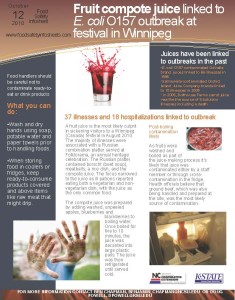According to the U.K. Health Protection Agency, the number of people who have reported suffering from symptoms including diarrhea and abdominal pain after attending the Street Spice festival has reached 250, with eight testing positive for salmonella.
This is the result of tests carried out by a multi-agency team in conjunction with the City Council’s Environmental Health officers and the Health  Protection Agency.
Protection Agency.
Environmental health officers are continuing to investigate and are talking to businesses and suppliers to try to identify the source of the outbreak.
The results of further tests will be known next week.
It is estimated that 12,000 people from across the region attended the event, which took place in Times Square between 28 February and 2 March.
Anyone who attended the event, whether they have been ill or not, are being advised to complete a confidential online questionnaire, available at http://tinyurl.com/streetspice.
Temporary food events bring their own food safety challenges. We have experience with this.
Investigating the potential benefits of on-site food safety training for Folklorama, a temporary food service event
06.oct.12
Journal of Food Protection®, Volume 75, Number 10, October 2012 , pp. 1829-1834(6)
Mancini, Roberto; Murray, Leigh; Chapman, Benjamin J.; Powell, Douglas A.
http://www.ingentaconnect.com/content/iafp/jfp/2012/00000075/00000010/art00014
Abstract:
Folklorama in Winnipeg, Manitoba, Canada, is a 14-day temporary food service event that explores the many different cultural realms of food, food preparation, and entertainment. In 2010, the Russian pavilion at Folklorama was implicated in a foodborne outbreak of Escherichia coli O157 that caused 37 illnesses and 18 hospitalizations. The ethnic nature and diversity of foods prepared within each pavilion presents a unique problem for food  inspectors, as each culture prepares food in their own very unique way. The Manitoba Department of Health and Folklorama Board of Directors realized a need to implement a food safety information delivery program that would be more effective than a 2-h food safety course delivered via PowerPoint slides. The food operators and event coordinators of five randomly chosen pavilions selling potentially hazardous food were trained on-site, in their work environment, focusing on critical control points specific to their menu. A control group (five pavilions) did not receive on-site food safety training and were assessed concurrently. Public health inspections for all 10 pavilions were performed by Certified Public Health Inspectors employed with Manitoba Health. Critical infractions were assessed by means of standardized food protection inspection reports. The results suggest no statistically significant difference in food inspection scores between the trained and control groups. However, it was found that inspection report results increased for both the control and trained groups from the first inspection to the second, implying that public health inspections are necessary in correcting unsafe food safety practices. The results further show that in this case, the 2-h food safety course delivered via slides was sufficient to pass public health inspections. Further evaluations of alternative food safety training approaches are warranted.
inspectors, as each culture prepares food in their own very unique way. The Manitoba Department of Health and Folklorama Board of Directors realized a need to implement a food safety information delivery program that would be more effective than a 2-h food safety course delivered via PowerPoint slides. The food operators and event coordinators of five randomly chosen pavilions selling potentially hazardous food were trained on-site, in their work environment, focusing on critical control points specific to their menu. A control group (five pavilions) did not receive on-site food safety training and were assessed concurrently. Public health inspections for all 10 pavilions were performed by Certified Public Health Inspectors employed with Manitoba Health. Critical infractions were assessed by means of standardized food protection inspection reports. The results suggest no statistically significant difference in food inspection scores between the trained and control groups. However, it was found that inspection report results increased for both the control and trained groups from the first inspection to the second, implying that public health inspections are necessary in correcting unsafe food safety practices. The results further show that in this case, the 2-h food safety course delivered via slides was sufficient to pass public health inspections. Further evaluations of alternative food safety training approaches are warranted.
